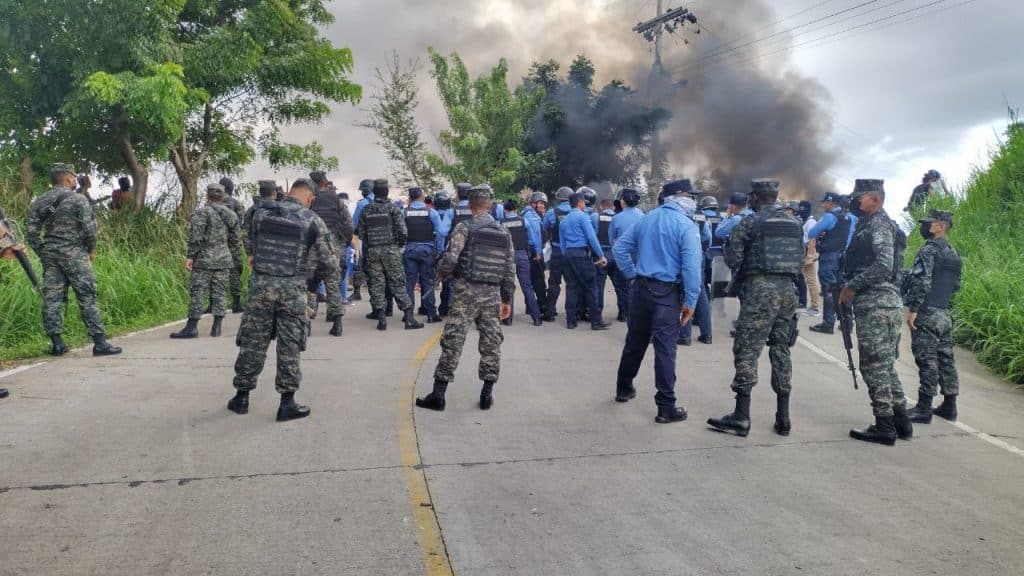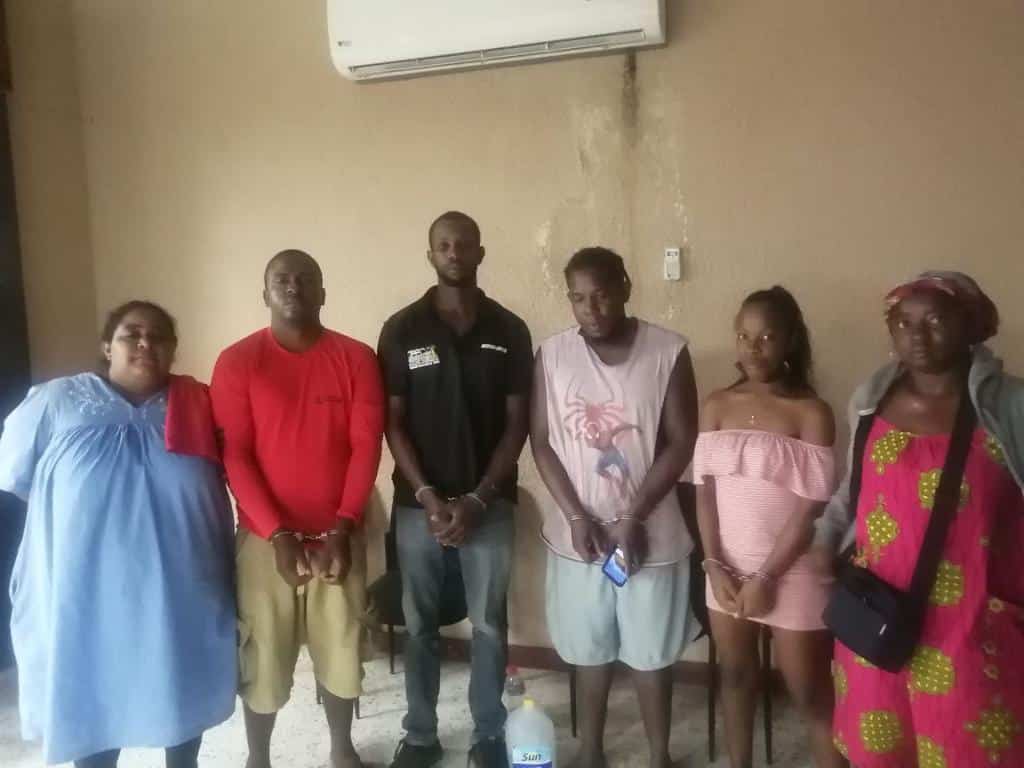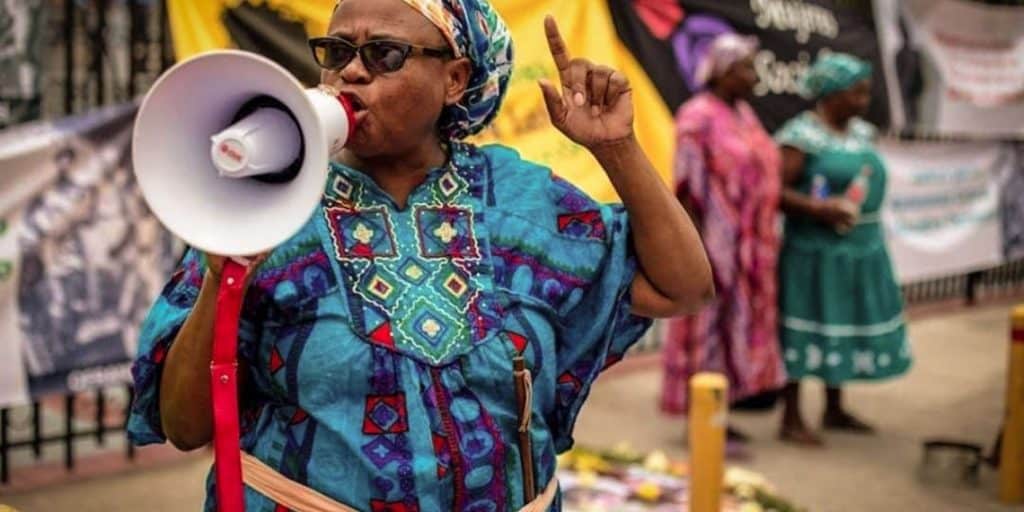The Garífunas of Honduras are an Afro-indigenous people who have lived on the country’s scenic northern coast for more than 225 years, before the republic was founded. In recent decades, they have come under increasing threats from private corporations in the tourism sector and extractive industries, among others, which have colluded with the state and organized crime to dispossess the communities of their lands.
The threats and violence have intensified in recent years, especially since 2015, when the Inter-American Court for Human Rights (IACHR) issued rulings against the state of Honduras and in favor of the Garífuna communities of Punta Piedra and Triunfo de la Cruz. These rulings required that the state provide reparations and guarantee the Garífuna people’s ancestral rights over their lands.
In the context of the communities’ struggle for their rights, four young leaders of Triunfo de la Cruz, including the president of the patronato (community council) Sneider Centeno, were abducted on July 18, 2020. The community has yet to receive answers from the state regarding their whereabouts.
Honduran president Xiomara Castro, who took office on January 27 amid great expectations of change, has failed to take any steps to comply with the IACHR rulings, despite having promised to do so during her campaign.
Meanwhile, the development of Special Economic Development Zones (ZEDEs) on Garífuna lands has continued. These are special-jurisdiction areas in which private companies are entitled to establish their own police forces and judicial, legal, and tax systems—a clear cession of sovereignty to foreign companies. While the National Congress repealed the law establishing these jurisdictions in April this year, after Castro’s inauguration, construction in these areas has continued, without further opposition from the national government.
On November 7, the National Police and the army carried out a violent eviction in the Garífuna community of Punta Gorda. Community members were brutally beaten and six land defenders were detained, including Melissa Martínez, coordinator of the Black Fraternal Organization of Honduras (OFRANEH) of Punta Gorda. An international outcry led to the release of the activists, but the charges against them remain.
La Izquierda Diario, Left Voice’s sister publication, spoke with Miriam Miranda, an activist and OFRANEH’s national coordinator, about the evictions and about the struggle of the Garífuna people under Xiomara Castro’s administration.
Can you tell us about the struggle of the Garífuna people for recognition of their rights over their land in the community of Punta Gorda?
It’s important to mention that the community of Punta Gorda is in the process of reoccupying its ancestral land. An essential fact is that it was the first community founded in Honduras, more than 225 years ago. When our ancestors arrived in 1797, they settled and were welcomed here in Punta Gorda. Bloody battles were being waged at the time between Spain and other colonizer countries such as England and France, and the Garífuna people were welcomed here so they could join the troops in the struggle to defend Honduras. So, our community already existed here before Honduras became a republic. And, therefore, Punta Gorda is not just any community. That’s why they can’t claim, as they are doing now, that we have to submit our “documents” — as if this were a conflict of interest between two individuals with a deed to a piece of land.
It’s important to emphasize this because the conflict is about an ancestral right that is recognized by Convention 169 of the International Labour Organization (ILO) on the rights of indigenous and tribal peoples. Since Honduras is a signatory of that Convention and of the Universal Declaration of Human Rights, we have been able to resort to the Inter-American judicial system. We, the Garífuna people, have the right to be taken into account and have our ancestral rights recognized, based on our ancestry as well as on international law concerning the rights of indigenous peoples.
The events that took place in Punta Gorda result from the fact that we have ancestral property here and there is a community that has lived here since our ancestors’ time.
What happened in Punta Gorda on November 7?
We were informed that there was going to be an eviction, and our comrades were very scared. They arrived here to evict the community at 11:30 that morning. The brutality with which they carried out the operation shows, as Melissa [Martínez, from OFRANEH] said, that they intended to kill us. That was the attitude of the police when they arrived. People were beaten; some had their arms broken. They didn’t even respect the elderly or the children.
There is an important question here that we want to look into. On whose behalf did the state — that is, the presiding judges and the prosecution — issue the orders? I think there are hidden interests here that we haven’t been able to identify. I think someone had something to gain from this.
Do you mean private companies in the tourism industry?
We’re talking about private companies and businesspeople, but also people who want to create a crisis. This is a strategic moment when candidates are being nominated for the Supreme Court. And the Supreme Court and the Public Prosecutor’s Office stand against Xiomara Castro’s government.
The brutality of the operation; the way they came in here to destroy everything, including the houses that had already been built; the way they beat our brothers and sisters — there is a pregnant woman who is severely injured — all of this is a strong message about what they intend to do, not only in Punta Gorda.
It’s important to mention the extreme hate and racism these events reveal. The build-up to this operation started a while back. There’s a local media outlet called Roatán Hable Claro that had been spewing hate, not only accusing the Garífuna people of invading the land, but also carrying out a hateful media campaign for months. That’s how they prepared the groundwork for November 7.
We also think it’s important to note that it was a joint operation between the army and the police. Some people were saying that the army didn’t take part, but that’s not true. The army was here. It’s in the photos and the videos. It was not only the National Police.

The opposition controls the judiciary, but the National Police and the army are under Xiomara Castro’s command. However, she claimed last week in a tweet that she hadn’t been informed of the eviction. How do you interpret that?
I believe there’s an intense struggle for power being waged and we’re caught in the middle. Powerful interest groups and the narco-dictatorship [under the National Party, now part of the opposition, which ruled the country from 2010 to 2021] strengthened their power in all government institutions. There are even reports that the heads of certain ministries can’t make certain decisions because they’re being blocked by mid-level authorities.
But I also believe that there’s an undeniable reality — that Xiomara’s government needs to make radical decisions in certain aspects to show her political will to address these problems. I’ve said this publicly. You can’t claim innocence when you’re running a country. I think that tweet was very ill-advised,because it makes her look even worse. She’s the president and the commander-in-chief of both the army and the police.
Now this conflict has emerged, which I think she didn’t expect, but it happened. Someone had something to gain from this and they made their move. I suppose they will investigate this to determine who it was, because what happened has made international headlines and has affected Xiomara’s government. The opposition is taking advantage of this. The people left over from the dictatorship — the cachos, as people here call them, from the National Party — are taking advantage of the situation after what happened on November 7.
Beyond the power struggles within the state, do you think there’s a lack of political will on the part of the executive to resolve the problems the Garífuna people are facing?
We have to take into account that the Inter-American Court of Human Rights issued two rulings against the state of Honduras in 2015. Almost eight years have since passed, and President Castro has clearly lacked the political will to take steps toward complying with the rulings. A high-level, inter-institutional commission needs to be set up. We don’t want a commission for people to go to for a photo-op. We want this to be a high-level commission where decisions can be made and where real steps can be taken toward complying with the rulings, which don’t just require decisions, but also significant budget allocations to restore the Garífuna people’s lands.
We have a problem if the government doesn’t make those decisions and doesn’t establish the administrative mechanisms needed to comply by establishing an inter-institutional commission. Soon Xiomara will have been in power for a year. This was part of her party’s campaign. They said that it was going to be a people’s government, which really raised people’s hopes. We fought against the dictatorship so that what happened here on November 7 would never happen again. People expect things to change.

What was the government’s reaction to the events of November 7?
The government’s reaction was the result of international pressure. We have to be very clear about this. The global outcry over these events led the United Nations and all the international human rights organizations to speak out and, of course, apply pressure on Xiomara. That’s why she had to respond to what happened. The detained activists were released the next morning, but alternative measures have been applied against them.
It’s important to note that this was done under an amendment to the Code of Criminal Procedure that criminalizes land defenders and is used to prosecute them by establishing stricter measures against reclaiming their lands.
After the global outcry, the National Congress appointed a Special Commission that came here to Punta Gorda and met with us. They’re going to submit a report next week on their visit. Minister of Human Rights Natalie Roque also came here with someone from SEDESOL (the Secretariat of Social Development). They made an emergency visit to hear people’s testimonies.
How have these events affected the Garífuna communities?
What happened here in Punta Gorda has greatly exacerbated the campaign of discrimination and hate on the coast against the other Garífuna communities. The community of San Juan is in the middle of legal proceedings before the Inter-American Court, seeking a ruling. The non-Garífuna people who live around the community are gathering in permanent assemblies because they say that the Garífuna communities want to take their property away from them. The problem is that people with economic power — the businessmen, investors, people linked to the drug trade, people involved in organized crime — are promoting this campaign of hatred against us.
We’re not just facing a third exile [in our history]; we’re facing genocide. They want to take advantage of everything that happened here — not just incite hatred, but also create the conditions and environment necessary so that an attack against the Garífuna people can be accepted and legitimized. As the general coordinator of OFRANEH, I’m tremendously concerned about this. We’re worried because we don’t know what will happen in the next few months.
What is the current security situation in the Garífuna communities?
The Inter-American Court of Human Rights and the UN Committee on Enforced Disappearances ruled on the disappearance [on July 18, 2020] of the community leaders of Triunfo de la Cruz, including the president of the patronato [community council]. Both organizations have asked the state to respond to the enforced disappearances and ensure the safety of their families and community. But instead there is a climate of terror in the community. Some audios have come out with truly horrifying death threats against community leaders.
Has there been no change in this regard under Xiomara Castro’s government?
This hasn’t changed. On the contrary, the vulnerability and the pressure, the climate of terror, have only worsened. They’re creating a climate of terror in the communities against the Garífuna people, against the community leaderships, so people will stop fighting, so that the communities will stop making demands and remain silent.
This year the law establishing the ZEDEs was repealed, but the construction of the Próspera ZEDE in Garífuna territory is still moving forward.
They’re building their famous towers there and they already have a tower that I think is twelve stories high, in an area where there is supposed to be no construction of that kind, because it’s an island. But they’re still constructing them. And they’ve stated on social media that they’re going to sue Honduras for billions of dollars.
I think the judicial system and how justice is applied in Latin America and the world is something that we have to pay close attention to. People always talk about the president, but the powers are distributed among people who make decisions in these institutions that were created precisely for that purpose and that are corrupt and can be manipulated. That’s where they plan and execute many of the actions carried out, not only against the communities and peoples who are resisting, but also against the executive branch.
We’ve already seen what happened in Honduras [the coup against President Manuel Zelaya in 2009] happen later in Brazil — and it will continue to happen in other countries. They have gradually created the conditions for this situation to exist, in which the communities are in a state of complete defenselessness, with a corrupt, murderous judicial system, a system that sells itself off to the highest bidder. That’s what we’re up against.
What are the Garífunas demanding from Xiomara Castro’s government?
She’s the person who has to create the inter-institutional commission to comply with the [IACHR] ruling. That’s the first thing we’re demanding, because she’s responsible for that. She’s the head of the executive. That will be a step forward in recognizing and respecting the rights of the Garífuna people.
One thing we have to be clear about is that the rulings against the state of Honduras and in favor of the communities of Punta Piedra and Triunfo de la Cruz affect all the communities. They don’t just affect those two communities. They require that the state respect communities’ human rights, but also that it recognize communities’ ancestral right to administer, control, and make use of its ancestral lands.
We also told the people who came [to Punta Gorda] from Congress that we don’t just want them to investigate the events [of November 7]. We want them to make recommendations that the National Congress can approve. My understanding is that the Special Commission was appointed not only to report on what happened, but also to review things like the amendment to the Code of Criminal Procedure and to see what has happened with the rulings. It’s an opportunity to move forward. We told them clearly that we want the report to allow the National Congress to make decisions.
How are the people resisting?
The people are steadfast in their resistance. I’m in the area and there was an assembly on Thursday of the community of Punta Gorda in which hundreds of people participated. They’re not going to stop fighting for their lands. I think that’s very important.
First published in Spanish on November 14 in La Izquierda Diario.
Translation by the author.











